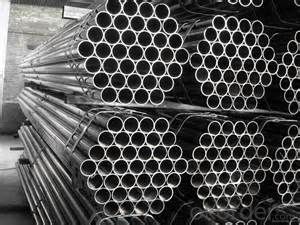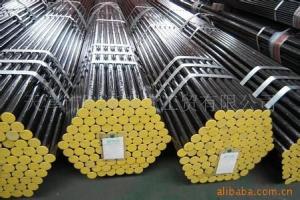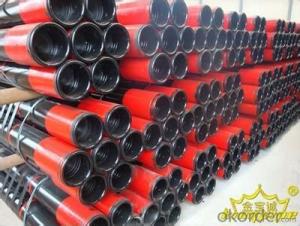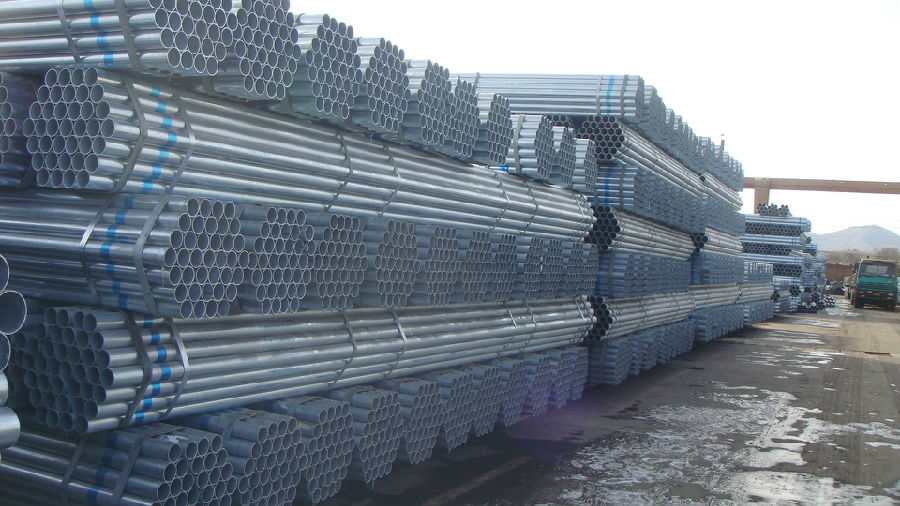Steel Pipe with High Quality and Best Price Q345 and so on
- Loading Port:
- Tianjin
- Payment Terms:
- TT OR LC
- Min Order Qty:
- 25 m.t.
- Supply Capability:
- 8000 m.t./month
OKorder Service Pledge
OKorder Financial Service
You Might Also Like
Product Description:
1、Structure of Steel Pipe Q345 Descrption:
steel welded pipe is actually a cover term, covering a wide range of alloy and making them suitable for different attributes that are used in a very wide and large numbers of different industries. Stainless steel pipe is resistant to erosion, highly flexible, powerful, easy to use, and can be done in distinct approaches, which means that more and more stainless steel was used as a construction material for large-scale, high impact buildings. It can be molded, rolling, and it can create amazing shapes to make it perfect, It is used as experimental buildings, The use of steel pipe welding of large stainless steel covers other examples.
2、Main Features of the Steel Pipe Q345:
·Highly demanded
·Durable
·Reliable
·resist corrosion
·reasonable price
3、Steel Pipe Q345 Images:

4、The Steel Pipe Q345 Specification:
Standard JIS, DIN, ASTM
JIS G3445-2006, JIS G3444-2006, JIS G3446-2004, DIN EN 10216-1-2004, DIN EN 10217-1-2005, DIN EN 10305, ASTM A106-2006, ASTM A53-2007, ASTM A789-2001, ASTM A1020-2002, ASTM A179-1990, ASTM A199Grade Cr-Mo alloy, Mo, ST35-ST52, Q195-Q345, CrNi alloy
15CrMo, 10CrMo910, 30CrMo, 15Mo3, 16Mo, St37, St52, St42, St45, Q235, Q345, Q195, Q215, Cr17Ni8, 1Cr13Mn9Ni1NThickness 2 - 50 mm Section Shape Round Outer Diameter 10 - 900 mm Secondary Or Not Non-secondary Application Structure Pipe Technique EFW Certification API Surface Treatment Paint Special Pipe API Pipe Alloy Or Not Non-alloy
Specifications
1.W.T from 2mm to 70mm
2.OD from 10 to 1200mm
3.product by our own factory
4.on time dilivery
5、FAQ of Square Tube:
①How is the quality of your products?
Our products are manufactured strictly according to national and internaional standard, and we take a test
on every pipe before delivered out. If you want see our quality certifications and all kinds of testing report, please just ask us for it.
Guaranteed: If products’ quality don’t accord to discription as we give or the promise before you place order, we promise 100% refund.
②How about price?
Yes, we are factory and be able to give you lowest price below market one, and we have a policy that “ for saving time and absolutely honest business attitude, we quote as lowest as possible for any customer, and discount can be given according to quantity”,if you like bargain and factory price is not low enough as you think, just don’t waste your time.Please trust the quotation we would give you, it is professional one.
③Why should you chose us?
Chose happens because of quality, then price, We can give you both.Additionally, we can also offer professional products inquiry, products knowledge train(for agents), smooth goods delivery, exellent customer solution proposals.Our service formula: good quality+good price+good service=customer’s trust
SGS test is available, customer inspection before shipping is welcome, third party inspection is no problem.
Any question, pls feel free to contact us !
- Q:How do you remove rust from steel pipes?
- To remove rust from steel pipes, there are several methods you can try: 1. Use a wire brush or steel wool: Start by scrubbing the rusted areas with a wire brush or steel wool. This will help remove loose rust and flakes from the surface of the pipes. 2. Apply vinegar or lemon juice: Soak a cloth or sponge in white vinegar or lemon juice and apply it to the rusted areas. Let it sit for a few hours or overnight. The acidic properties of these substances can help dissolve the rust. 3. Use a rust remover or converter: There are various rust remover products available in the market. Follow the instructions on the product and apply it to the rusted areas. These solutions typically convert rust into a water-soluble compound that can be easily rinsed off. 4. Apply a paste of baking soda and water: Mix baking soda with water to create a thick paste. Apply the paste to the rusted areas and let it sit for a few hours. Scrub the area using a brush or steel wool, and then rinse it off. 5. Try using a commercial rust dissolver: If the above methods don't yield satisfactory results, you can consider using a commercial rust dissolver. These products are specifically designed to remove rust from various surfaces, including steel pipes. Follow the instructions provided by the manufacturer. Remember to wear protective gloves, goggles, and a mask when working with rust removal products, as they can be corrosive or release toxic fumes. Additionally, after removing rust, it is advisable to apply a rust-inhibiting primer or paint to prevent future rusting.
- Q:What is the difference between black steel pipe and galvanized steel pipe?
- The main difference between black steel pipe and galvanized steel pipe lies in their coating. Black steel pipe is untreated and has a dark, matte appearance, while galvanized steel pipe is coated with a layer of zinc to prevent rusting and has a silver, shiny appearance. This coating makes galvanized steel pipes more durable and suitable for outdoor use, while black steel pipes are commonly used for indoor plumbing and gas lines.
- Q:How are steel pipes used in the construction of power plants?
- Steel pipes are used in the construction of power plants to transport various fluids, such as water, steam, and fuel, throughout the facility. They are essential for ensuring a reliable and efficient flow of these substances, which are crucial for the operation of power generation equipment. Additionally, steel pipes are also used for structural support and to create ventilation and exhaust systems within the power plant.
- Q:How are steel pipes used in the manufacturing of furniture?
- Steel pipes are often used in the manufacturing of furniture as structural components. They are commonly employed for creating sturdy frames for chairs, tables, and other items. The pipes provide strength and durability, allowing furniture to withstand heavy loads and daily use. Additionally, steel pipes are often used for creating unique designs and modern aesthetics in furniture pieces.
- Q:Can steel pipes be used for conveying hydraulic fluids?
- Indeed, hydraulic fluids can indeed be conveyed using steel pipes. The reason behind this lies in the fact that steel pipes possess remarkable tensile strength and are highly resistant to intense pressure, rendering them ideal for hydraulic purposes. They are capable of enduring the frequently encountered high pressures and temperature fluctuations within hydraulic systems. Moreover, steel pipes boast longevity and durability, guaranteeing dependable and efficient fluid transmission in hydraulic systems. Nevertheless, it is crucial to verify the compatibility between the steel pipes employed and the particular hydraulic fluid being conveyed, in order to prevent corrosion or deterioration of the pipe material.
- Q:DN80 seamless steel tube, what is the standard thickness?
- Commonly used DN80 seamless steel pipe caliber should be 89mm*4mm.
- Q:Are steel pipes suitable for use in acidic environments?
- Yes, steel pipes are generally suitable for use in acidic environments. However, the specific grade of steel and the concentration of the acid should be considered to ensure proper corrosion resistance. Coating or lining the pipes with materials such as epoxy or rubber can also enhance their resistance to acidic conditions.
- Q:How are steel pipes used in the renewable energy sector?
- Steel pipes are commonly used in the renewable energy sector for various purposes, primarily in the construction and installation of infrastructure for wind and solar energy projects. Steel pipes are used to support and anchor wind turbine towers, as well as to transport compressed air or hydraulic fluid for the operation of wind turbines. They are also utilized in the construction of solar panel frameworks, providing stability and durability. Additionally, steel pipes are used in geothermal energy projects for the extraction and transportation of hot water or steam from underground sources to power plants. Overall, steel pipes play a crucial role in enabling the efficient and reliable operation of renewable energy systems.
- Q:What are the common uses of steel pipes in construction?
- Steel pipes are commonly used in construction for various purposes due to their durability and strength. One of the most common uses of steel pipes in construction is for plumbing systems. Steel pipes are often used to carry water, gas, and other fluids throughout a building. They are preferred over other materials due to their resistance to corrosion and ability to withstand high pressure. Another common use of steel pipes in construction is for structural support. Steel pipes are often used as columns or beams to provide structural integrity to buildings. They can support heavy loads and provide stability to structures, making them a popular choice in the construction industry. Steel pipes are also commonly used in the construction of bridges and highways. They are used for creating strong and durable bridge supports, guardrails, and signposts. Steel pipes are able to withstand extreme weather conditions and heavy traffic, making them a reliable choice for infrastructure projects. Furthermore, steel pipes are used for underground utilities such as sewer and drainage systems. They provide a strong and long-lasting solution for transporting wastewater and preventing leaks. Steel pipes are also used in the construction of underground tunnels and pipelines. In addition to these common uses, steel pipes are also utilized in construction for fencing, scaffolding, and handrails. They are chosen for their strength, versatility, and ability to withstand harsh environmental conditions. Overall, steel pipes are an essential component in construction due to their numerous advantages. Their durability, strength, and resistance to corrosion make them a reliable choice for various applications in the construction industry.
- Q:Can steel pipes be used for conveying abrasive slurries?
- Indeed, abrasive slurries can be effectively conveyed through steel pipes. The remarkable durability and strength of steel pipes render them highly suitable for the transportation of abrasive substances like slurries. Nevertheless, to guarantee prolonged service life and avert excessive deterioration, it is crucial to carefully choose the right grade of steel and take into account factors such as pipe thickness, lining choices, and flow velocity. Furthermore, the implementation of adequate maintenance and inspection protocols can play a pivotal role in promptly identifying and resolving any wear or corrosion issues that may arise with time.
1. Manufacturer Overview |
|
|---|---|
| Location | |
| Year Established | |
| Annual Output Value | |
| Main Markets | |
| Company Certifications | |
2. Manufacturer Certificates |
|
|---|---|
| a) Certification Name | |
| Range | |
| Reference | |
| Validity Period | |
3. Manufacturer Capability |
|
|---|---|
| a)Trade Capacity | |
| Nearest Port | |
| Export Percentage | |
| No.of Employees in Trade Department | |
| Language Spoken: | |
| b)Factory Information | |
| Factory Size: | |
| No. of Production Lines | |
| Contract Manufacturing | |
| Product Price Range | |
Send your message to us
Steel Pipe with High Quality and Best Price Q345 and so on
- Loading Port:
- Tianjin
- Payment Terms:
- TT OR LC
- Min Order Qty:
- 25 m.t.
- Supply Capability:
- 8000 m.t./month
OKorder Service Pledge
OKorder Financial Service
Similar products
New products
Hot products
Related keywords
































